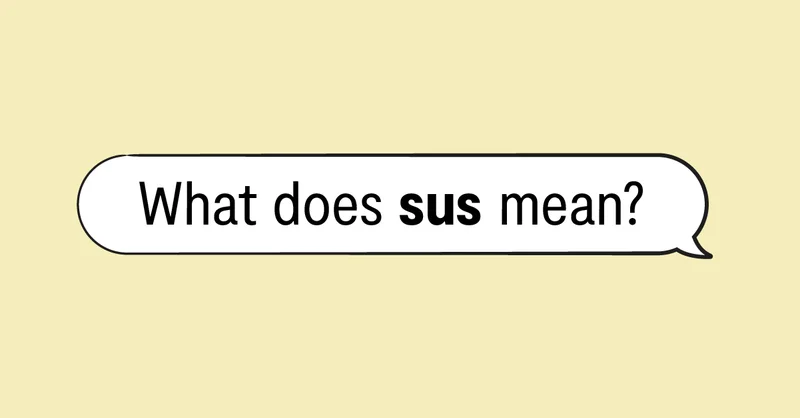Article Directory
The SUS Signal: How One Three-Letter Word Broke the Internet's Brain
There are moments when the raw data of the internet reveals a fracture in our collective reality. These are not subtle shifts; they are seismic spikes in a chart that leave you staring at the screen, trying to understand the mechanism behind the anomaly. The explosion of the term "sus" is one such event.
For decades, the acronym "SUS" existed in specific, siloed corners of the professional and scientific worlds. It was a stable, low-volume signal. It referred to the Society of University Surgeons, a premier organization for academic surgeons. It was the ticker-like identity for SUS Environment, a global waste-to-energy provider making inroads in Southeast Asia. In biology, it’s the genus name for pigs and wild boars (Sus scrofa). Each had its own distinct, quiet audience.
Then, in 2020, the online multiplayer game Among Us went viral. With it came its primary piece of slang: "sus," a shorthand for suspicious. The term's usage didn't just grow; it detonated. Search volume for "what does sus mean" and "sus meme" exploded by thousands of percent—to be more precise, a chart of its search interest looks less like a growth curve and more like a rocket launch.
What happened next is a perfect case study in data collision. A simple, three-letter word, once a reliable identifier for distinct entities, became a memetic black hole, pulling all other meanings into its orbit and rendering them practically invisible. This isn't just a linguistic curiosity. It's a breakdown in our information architecture.
A Collision of Contexts
Imagine you are Dr. Dai Chung. You are a highly acclaimed pediatric surgeon, recently honored with the 2025 Lifetime Achievement Award from the Society of University Surgeons. It’s the highest honor from your peers. You decide to search for news about your own award, typing the society’s well-known acronym, "SUS," into Google.
You are not met with press releases from the Academic Surgical Congress or articles on surgical science. Instead, your screen fills with a chaotic collage of brightly colored, bean-shaped astronauts from Among Us. You see headlines for "sus videos," links to "sus games," and a seemingly infinite scroll of "sus face" GIFs. How does a century-old professional society even begin to compete for search relevance against a globally viral meme? What does it do when its very identity is co-opted by pop culture?
The problem extends beyond academia. Consider SUS Environment, a Chinese company that, according to its own press releases, has captured roughly 35% of Thailand's waste-to-energy market. They are building massive plants (one manufacturing center is a 50,000-square-meter facility) and making strategic acquisitions. This is a serious, capital-intensive business. Yet, any potential investor or partner performing due diligence with a simple search for "SUS" is immediately wading through an ocean of Gen Z slang.

And this is the part of the data I find genuinely puzzling. We have, simultaneously, a scientific paper on complement system activation in wild boar (Sus scrofa), SUS Leads Thailand’s Waste-to-Energy Market with Integrated Tech, Manufacturing, and Service Model, and Chung honored with SUS Lifetime Achievement Award: Honors & Awards, all using the same three letters that now primarily mean "you seem fake."
This is like the New York Stock Exchange suddenly assigning the same ticker symbol to a biotech firm, a steel manufacturer, and a wildly popular new candy company. The resulting confusion wouldn't just be funny; it would paralyze the market. Our information market is now in a similar state of paralysis over this term. The signal is completely lost in the noise.
The Algorithm Doesn't Understand the Joke
The core of the issue lies in how our digital world is indexed and ranked. Search algorithms are designed to measure and reward engagement—clicks, shares, time on page. Memes are machines purpose-built for engagement. They are simple, emotionally resonant, and infinitely remixable. A peer-reviewed article on immunology in Sus scrofa simply cannot compete on these metrics.
The result is a phenomenon I call "semantic bleaching," where the overwhelming popularity of one meaning effectively erases all others from the accessible layer of the internet. The algorithm doesn't understand context or intent; it just follows the clicks. Is a search for "SUS" an inquiry into municipal waste management in Thailand, a search for a medical society, or just a kid looking for a funny GIF? The raw data point is the same, which means the data itself is fundamentally compromised.
This raises a critical question about the reliability of our digital tools. If a simple meme can so thoroughly dominate a keyword that it digitally shadows legitimate organizations and scientific terms, what does that say about the integrity of our information retrieval systems? We treat search engines as neutral arbiters of information, but they are biased toward the popular, the loud, and the easily digestible. Subtlety, professionalism, and scientific specificity are algorithmic disadvantages.
What is the long-term cost of this dynamic? Will organizations be forced to rebrand, abandoning decades of established identity simply because they had the misfortune of sharing an acronym with a meme? And as more of our world is mediated by algorithms that can't distinguish between a joke and a surgeon, how much important information are we unknowingly leaving behind, buried on page ten of the search results?
The Data Is Corrupted
Ultimately, the "sus" phenomenon is more than just an internet joke. It's a warning flare. It demonstrates that our information ecosystem is brittle, easily manipulated by the firehose of pop culture, and fundamentally incapable of parsing human context. For an analyst, this is a disaster. It means a keyword, a primary unit of data, can have its meaning completely inverted overnight, and the machines we rely on to sort the world's information won't even notice. They'll just serve up the meme, because that's what the numbers tell them to do. The signal is gone; only the noise remains.
